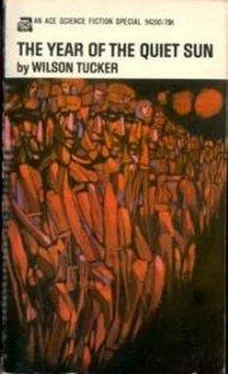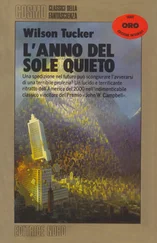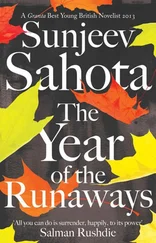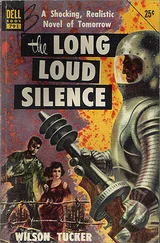Wilson Tucker - The Year of the Quiet Sun
Здесь есть возможность читать онлайн «Wilson Tucker - The Year of the Quiet Sun» весь текст электронной книги совершенно бесплатно (целиком полную версию без сокращений). В некоторых случаях можно слушать аудио, скачать через торрент в формате fb2 и присутствует краткое содержание. Год выпуска: 1970, ISBN: 1970, Издательство: Ace Books, Жанр: Фантастика и фэнтези, на английском языке. Описание произведения, (предисловие) а так же отзывы посетителей доступны на портале библиотеки ЛибКат.
- Название:The Year of the Quiet Sun
- Автор:
- Издательство:Ace Books
- Жанр:
- Год:1970
- ISBN:0-441-94201-6
- Рейтинг книги:3 / 5. Голосов: 1
-
Избранное:Добавить в избранное
- Отзывы:
-
Ваша оценка:
- 60
- 1
- 2
- 3
- 4
- 5
The Year of the Quiet Sun: краткое содержание, описание и аннотация
Предлагаем к чтению аннотацию, описание, краткое содержание или предисловие (зависит от того, что написал сам автор книги «The Year of the Quiet Sun»). Если вы не нашли необходимую информацию о книге — напишите в комментариях, мы постараемся отыскать её.
Won retrospective John W. Campbell Memorial Award in 1976.
Nominated for Nebula Award for Best Novel in 1970.
Nominated for Hugo Award for Best Novel in 1971.
The Year of the Quiet Sun — читать онлайн бесплатно полную книгу (весь текст) целиком
Ниже представлен текст книги, разбитый по страницам. Система сохранения места последней прочитанной страницы, позволяет с удобством читать онлайн бесплатно книгу «The Year of the Quiet Sun», без необходимости каждый раз заново искать на чём Вы остановились. Поставьте закладку, и сможете в любой момент перейти на страницу, на которой закончили чтение.
Интервал:
Закладка:
On a vagrant impulse — and because it lay in his direction — Moresby turned sharply to cut across a yard to E Street: the swimming pool was near at hand. He glanced at the sky and found it appreciably lighter: the real dawn was coming, bringing promise of a hot July day.
Moresby gained the fence surrounding the patio and the pool and stopped running, because his breath was spent. Cautiously, rifle ready, he moved through the entranceway to probe the interior. The recreation area was deserted. Moresby walked over to the tiled rim and looked down: the pool was drained, the bottom dry and littered with debris — it had not been used this summer. He expelled a breath of disappointment. The next to last time he’d seen the pool — only a few days ago, after all, despite those twenty years — Katrina had played in the blue-green water wearing that ridiculous little suit, while Art had chased her like a hungry rooster, wanting to keep his hands on her body. A nice body, that. Art knew what he was doing. And Chaney sat on the sun deck, mooning over the woman — the civilian lacked the proper initiative; wouldn’t fight for what he wanted.
The mortars boomed again in the familiar one-two pattern. Moresby jumped, and spun around.
Outside the patio fence he saw the automobile parked at the curb a short distance up the street, and cursed his own myopic planning. The northwest corner was a mile or more away, an agonizing distance when on foot.
Moresby stopped in dismay at sight of the dashboard.
The car was a small one-painted the familiar olive drab — more closely resembling the German beetle than a standard American compact, but its dash was nearly bare of ornament and instrument controls. There was no key, only a switch indicating the usual on-off positions; the vehicle had an automatic drive offering but three options: park, reverse, forward. A toggle switch for headlights, another for the windshield wipers completed the instrument cluster.
Moresby slid in under the wheel and turned the switch on. A single idiot light blinked at him briefly and stayed out. Nothing else happened. He pushed the selector lever deeper into park, flicked the switch off and on again, but without result other than a repetitious blinking of the idiot light. Cursing the balky car, he yanked at the lever — pulling it into forward — and the car quickly shot away from the curb. Moresby fought the wheel and kicked hard on the brake, but not before the vehicle had ricocheted off the opposite curb and dealt a punishing blow to his spine. It came to a skidding stop in the middle of the street, throwing his chest against the wheel. There had been no audible sound of motor or machinery in motion.
He stared down at the dashboard in growing wonder and realized he had an electric vehicle. Easing off on the brake, he allowed the car to gather forward momentum and seek its own speed. This time it did not appear to move as fast, and he went down gently on the accelerator. The car responded, silently and effortlessly.
Moresby gunned it, running for the northwest fence. Behind him, the rattle of gunfire around the gate seemed to have lessened.
The truck was still burning. A column of oily black smoke climbed into the early morning sky.
Major Moresby abandoned the car and leaped for the ground when he was within fifty yards of the perimeter. A second hole had been torn in the fence, blasted by short mortar fire, and in his first quick scan of the area he saw the bodies of two aggressors sprawled in the same opening. They wore civilian clothing — dirty shirts and levis — and the only mark of identification visible on either corpse was a ragged yellow armband. Moresby inched toward the fence, seeking better information.
The mortar was so near he heard the cough before the explosion. Moresby dug his face into the dirt and waited. The shell landed somewhere behind him, up slope, throwing rocks and dirt into the sky; debris pelted the back of his neck and fell on his unprotected head. He held his position, frozen to the ground and waiting stolidly for the second mortar to fire.
It never fired.
After a long moment he raised his head to stare down the slope beyond the ruptured fence. The slope offered poor shelter, and the enemy had paid a high price for that disadvantage: seven bodies were scattered over the terrain between the fence and a cluster of tree stumps two hundred yards below. Each of those bodies was dressed alike: street clothing, and a yellow band worn on the left arm.
Ramjets.
Moresby slid his gaze away to study the terrain.
The land sloped gently away from his own position and away from the protective fence, dropping down two hundred yards before leveling off into tillable area. Flat land at the bottom looked as though it had been plowed in the spring, but no crop grew there now. A billboard stood at the base of the slope looking toward the main line of the Chicago and Mobile Southern Railroad, another five hundred yards beyond the plowed area. Thirty yards north of the billboard and five yards higher up the slope was a cluster of seven or eight tree stumps that had been uprooted from the soil and dumped to one side out of the way; the farmer had cleared his tillable area but hadn’t yet burned the unwanted stumps. The wheel marks of an invading truck showed clearly on the field.
Moresby studied the billboard and then the stumps. If he were directing the assault he would place a mortar behind each one; they were the only available cover.
Moving cautiously, he brought up the rifle and put two quick shots through the billboard near its bottom. Another two shots followed, biting into the tall grass and weeds immediately below the board. He heard a shout, a cry of sudden pain, and saw a man leap from the weeds to run for the stumps. The bandit staggered as he ran, holding pain in his thigh.
He was a soft target. Moresby waited, leading him.
When the running man was, just halfway between the billboard and the nearest stump, he fired once — high, aiming for the chest. The falling body tumbled forward under its own headlong momentum and crashed to earth short of the stump.
The cough of the mortar was a grotesque echo.
Moresby delayed for a second — no more — and thrust his face into the dirt. There had been a furtive movement behind the stumps. The shell burst behind him, striking metal now instead of dirt, and he spun around on his belly to see the electric car disintegrate. Direct hit. Fragments rained down on him and he threw up his hands to protect his head and the back of his neck. His fingers stung.
The rain stopped. Moresby sat up and threw an angry brace of shots at the stumps, wanting to put the fear of God into the mortarman. He fell back quickly to await the cough of the second mortar. It did not come. A stillness; other than the headlong rush of the wind and the tiny sound of sporadic firing at the main gate. Moresby felt a sudden heady elation: that back-up mortar was out of action. One down . Deliberately sitting up, deliberately taking aim, he emptied the rifle at the offending tree stumps. There was no answering fire, despite the target he offered. He had nothing more than a mortar to contend with — a mortar manned by a civilian. A poor goddamned civilian.
Moresby discovered a trickle of blood on his fingers and knew the keen exuberance of battle. A shout declared his gleeful discovery. He rolled to the ground to reload his weapon and shouted again, hurling a taunt at the enemy.
He searched the area behind the fence for the defenders, the Corporal’s guard he’d picked up on the radio. They should have joined him when he opened fire down slope. His searching glance picked out three men this side of the fence, near the burning truck, but they couldn’t have joined in. The empty shoes and helmet liner of a fourth man lay on the scarred ground ten yards away. He caught a flicker of movement in a shell hole — it may have been no more than the bat of an eye, or the quiver of parched lips — and found the only survivor. A bloodless face stared over the rim of the hole at him.
Читать дальшеИнтервал:
Закладка:
Похожие книги на «The Year of the Quiet Sun»
Представляем Вашему вниманию похожие книги на «The Year of the Quiet Sun» списком для выбора. Мы отобрали схожую по названию и смыслу литературу в надежде предоставить читателям больше вариантов отыскать новые, интересные, ещё непрочитанные произведения.
Обсуждение, отзывы о книге «The Year of the Quiet Sun» и просто собственные мнения читателей. Оставьте ваши комментарии, напишите, что Вы думаете о произведении, его смысле или главных героях. Укажите что конкретно понравилось, а что нет, и почему Вы так считаете.












